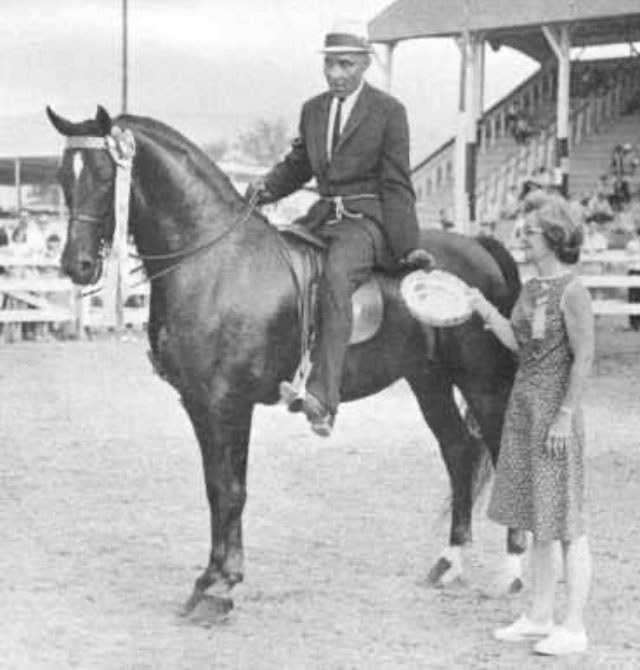
No one could show a horse like Joe Parker. As a self-assured Black man with a commanding presence in the ring and the modest personality of a true professional showman, he demanded attention from the judge and audience every time he trotted into the ring with a talented horse, whether it be under saddle, driving, or in-hand. He revolutionized the Morgan Park Horse in the 1960s and ‘70s, showcasing horses that trotted off their hocks and sat higher in the bridle and taking the show ring by storm, directly in the face of racial inequalities. Moreover, he taught his sons to be the same consummate horsemen that he was.
Helen Herold, the Director of the National Museum Of The Morgan Horse says, “What did this man give to the Morgan horse industry? He left a large family of gifted horsemen to pass down his knowledge… Joe Parker’s legacy is complex—he was from the South, with Saddlebred methods, showing Morgans in their heartland. At the same time his legacy is very simple—what he and his sons did with their many memorable achievements had an undeniable influence on the way Morgans are shown.”
Starting a Movement
Born in 1917, Joe Parker was an only child who was born and raised in Baltimore, MD. Despite growing up in the city with oppressive regimes based on the color of his skin, he had a deep love for animals and was drawn to horses. He began working for a horse farm just outside of Baltimore, where he first cleaned stalls and then eventually worked his way up to breaking and training horses for the farm. He grew to have a passion for Saddlebreds and was given the opportunity to train saddle horses for renowned ASB enthusiast Russell Law at his Boxwood Manor Farm in Towson, MD.
Unfortunately, when Law passed away in 1955, Joe found himself without a job and unable to support his growing family. So, he and his wife Marie “Ebbie” Hicks took a chance at a better life and moved their family north to New York. While the Saddlebred breed had a special place in his heart, Joe took on a few Morgans to train in order to make ends meet. The rest, as they say, is history.
Jerome Parker, Joe’s grandson and popular current ringmaster recounts, “He applied his Saddlebred knowledge to these horses and made them the best they could be. He always said, ‘A horse is a horse, talent is talent, no matter what breed they are.’”
“He experienced a bit of silent racism in the Saddlebred community,” Jerome explains. “Remember, this was back in the 1950s and ‘60s and there was a lot going on in the country, especially for a Black man.” This era brought about the Civil Rights Act of 1964, which sought to end segregation and discrimination based on race, color, religion, gender, or national origin. “He didn’t really have opportunities in the show ring when he was training Saddlebreds, but the Morgan community welcomed him with open arms. That certainly didn’t mean that it was easy for him, but they let him come in and show what he was capable of. The Morgan world helped my family realize their dreams in a time of segregation, civil unrest, and the assassinations of Martin Luther King, Jr., JFK, Malcolm X, Medgar Evers, and so many more.” Jerome continues, “I think the Morgan world was really progressive in that sense. In essence, they said, ‘If you think you can compete, then come compete with the best.’”
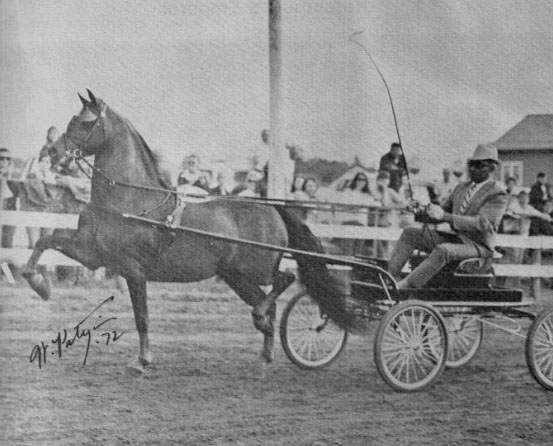
And compete with the best he did. Joe entered the Morgan show scene and saw great success with his Park horses who were trained a bit differently than the horses they were used to. In 1964, Joe Parker trotted into the ring at the Northampton Morgan Horse Show, the pinnacle of Morgan competition at the time, on his Morgan John May’s Bay State Gallant (Orcland Leader x Narcissa). With exceptional turnout, attention to detail, and a different training style than was previously seen on the Morgan circuit, Joe and Bay State Gallant were victorious in the park saddle class and championship, as well as the park harness class and championship.
“My grandfather [Joe] had a quiet demeanor, but bold and a fierce competitor. He was a true southern gentleman,” Jerome remembers. “He was always trying to push the envelope and make his horses better. He hit the show ring and they would just light up. He was a showman in every sense of the word.”
Joe’s dominance in the Morgan rings continued, winning the Park Saddle Championship at the New England Morgan Horse Show four times in five years between 1964 and 1968. “The ’60s, ’70s, and early ’80s were high times with large show strings traveling to Mid-A, Gold Cup, Syracuse, Harrisburg, Southern States, Quentin, the New England Circuit, and, starting in 1973, Grand National,” explains Helen Herold.
A Family Affair
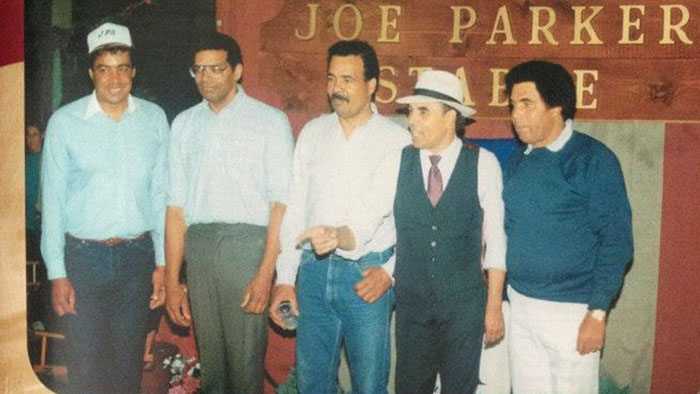
As Joe trained talented horses, he also trained talented horsemen who would continue his legacy. Joe and Marie had six children together, five boys (Joe Jr., Bill, Hugh, Leslie, and Bernard) and a girl (Dorthea). Of the five boys, all but Joe Jr. continued on to be horse trainers. Together, in Amenia, NY, Joe and his sons made a name for themselves under the banner of Joe Parker Stables.
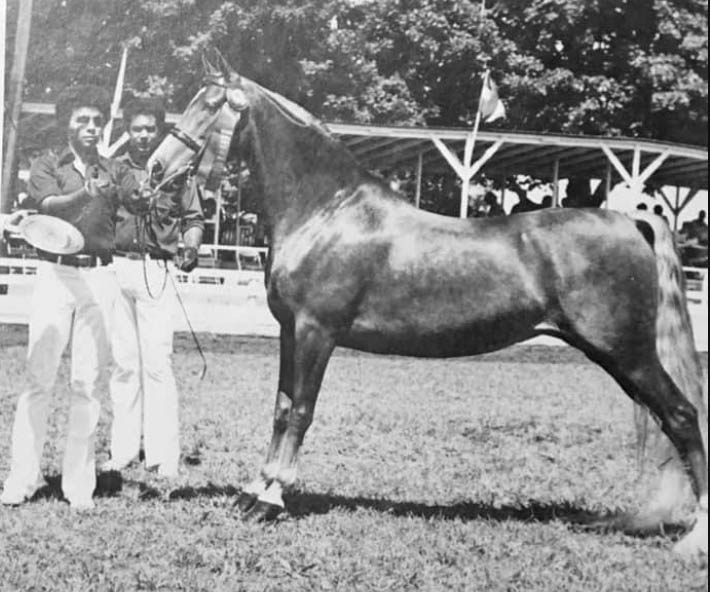
While they primarily trained Morgans, the four brothers branched out into Saddlebreds as well, with impressive horses and championship rides. The “Parker Brothers” as they were known were a force to be reckoned with, with many championship accolades, dominating the Park Under Saddle and In Harness divisions, while also putting in magnetic performances in-hand. The Parker Brothers’ signature style was characterized by snappy burgundy shirts and white pants in the halter ring.
It was Joe’s son Hugh who took the next step and jumped into the Arabian breed, ready for the next challenge. “I think that he was the most adventurous,” says Jerome of his father. “He was ready to make a name for himself in another industry.”
Hugh moved on to Blackwatch Arabian Farm, which opened up new opportunities. “Much like my grandfather’s introduction to Morgans, Dad didn’t really know what Arabians were supposed to be, but he knew good horseflesh and that was enough. They may be different breeds, but so much is the same, they need to be athletic, pretty, and talented,” he continues.
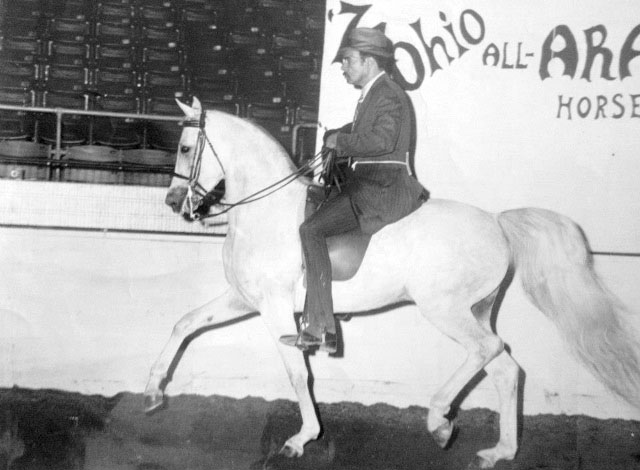
As one of the only people of color in the Arabian industry, he knew that he would have to work hard to be accepted, but he loved the breed, the people, and everything about the horse shows. “As a Black man, he had to work hard to earn his stripes, but he got credit for it,” Jerome remarks. “The breed accepted him because they realized he was good for the breed. He showed horses well and was always turned well. Since my grandfather, there has been a great emphasis on the turnout of the horses.”
Whenever the Parker Brothers showed up with horses, people sat up in their seats to watch. “People gravitated towards their charisma, and when they presented a horse they had a style all their own that people noticed,” Jerome remarks. Additionally, they were remarkable storytellers, with booming voices that captivated audiences as they recounted their father’s success of yesteryear.
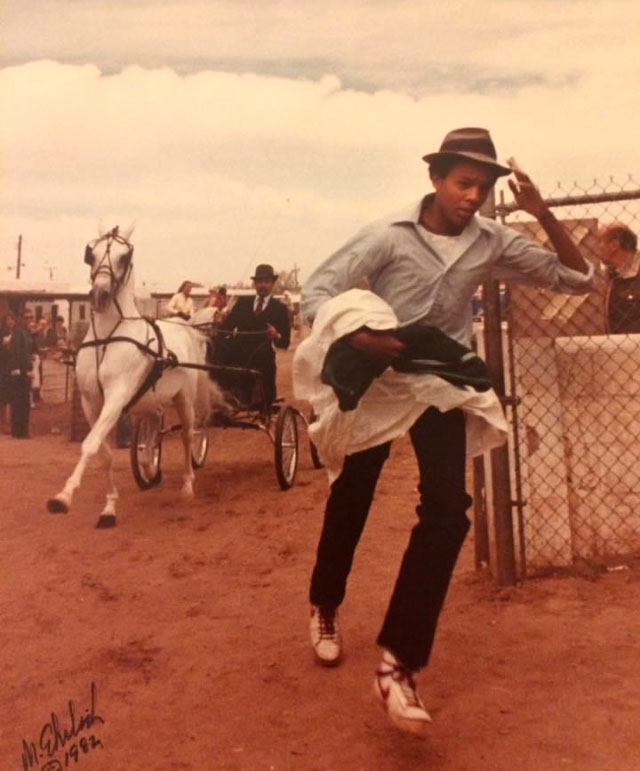
Despite their successes, they faced a myriad of challenges as they fought to achieve racial equality, “I’ve witnessed incidents where my uncles were singled out and embarrassed in front of their peers. Such as one time, leaving the ring being stopped and accused of something they never did. Another time being singled out for not wearing the appropriate attire in the ring even though it was the same outfit used every time showing many in-hand entries to World Championships for over 25 years. These things may seem petty, but they add up and weigh on you, especially as a Black man.”
However, overall, Jerome credits the progressive Morgan and Arabian industries for allowing the Parker family to showcase their talents, despite the color of their skin. “One thing that is not overlooked with the Parker family is the opportunity given to them by the Morgan Horse breed and its owners. Joe Parker and his sons always felt that the Morgan Breed was ahead of its time and gives the owners credit for the arrival of Joe Parker to the show ring. Even though it would still have difficulties, they at least had the chance and that’s all they asked,” says Jerome. “The Arabian breed also deserves much credit for the emergence of Hugh Parker, who embarked on his own date with destiny.”
The Story Continues
A third-generation horseman, Jerome grew up riding horses of all breeds under the tutelage of his father, Hugh. “We grew up in the barn,” he laughs. “Dad taught us how to work horses and take care of them, for the Parker Family, horses were always a family business.”
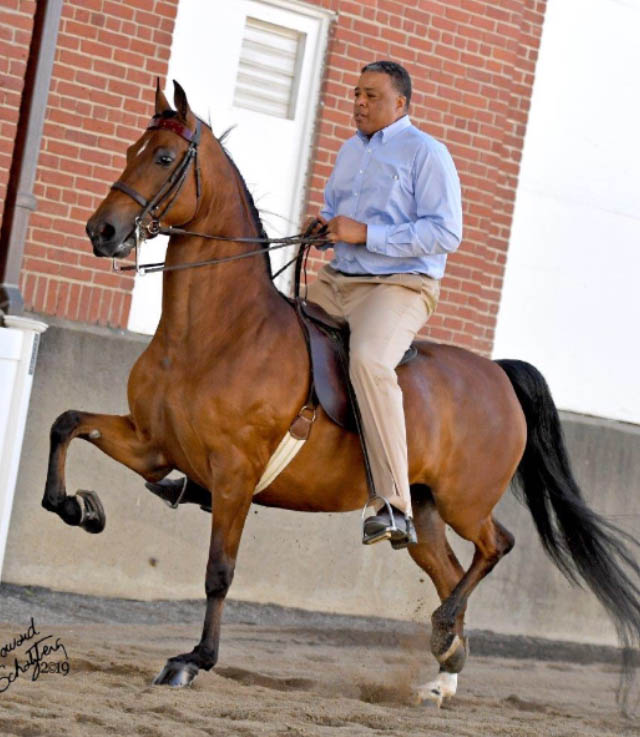
“My brothers and I grew up being true horse show competitors, you could say that we were all bit by the bug. The horses, the competitions, the thrill of the camaraderie, all of it, it is so addicting.”
For Jerome and his brothers, horses were in their blood, but after several decades as a horse trainer, Jerome knew that he needed something different. “I took a break for a while,” he says. “I started working at a factory. But, they don’t tell you this in the beginning, once you are part of the horse world, you never truly leave.”
He answered a phone call one day, from a friend, asking a favor. He was wondering if Jerome would be able to stand in as the ringmaster at the Mason Dixon Horse Show in Quentin, PA. “I went out there to help him,” Jerome continues. “I never realized how much I would enjoy it.” From there, Jerome began ringmastering on a regular basis, adding more and more shows to his roster each year, until he decided to make it a full-time job. Last year, in 2020, Jerome became only the second ringmaster to win the People’s Choice Award for the Morgan breed as well as the Saddlebred breed in the same year. Additionally, he is also an External Thought Leader who contributes to the development and execution of US Equestrian’s Diversity, Equity, and Inclusion (DEI) Action Plan.
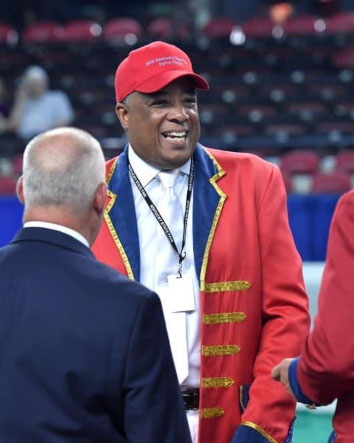
In 2021, Jerome is scheduled to work 24 horse shows. “I never saw it coming, it was never anything that I ever imagined, but I really enjoy my job. I’ve grown up with many of the people who are horse showing; so, I get the best seat in the house when I watch the show from the center ring and keep the show running smoothly. I do believe that, like my grandfather (but to a much, much smaller degree), I’m shining a positive light on my race in a profession in which Black people are not commonly seen.” Joe Parker clearly has left behind a legacy of horsemen who are dedicated to the good of the sport.
“Joe Parker Stables, to me, housed the history of the Black person in America,” concluded Jerome. “You had trailblazers, pioneers, entertainers, and courageous people who dared to be great. There were great accomplishments, controversy, tragedy, and pride that said, ‘I will not accept second best.’”
All Photos Courtesy of Jerome Parker/Center Ring Services

Jerome I see so much of your Uncle Bernard in you! II have fond memories and think of him often, no one could make me laugh the way Bernie P did! Your Grandfather passed away the year I moved to NY to work for Linda Getman, RAELYN FARM.
Awesome Work Done Men congratulations and continue success always
Emma’s Son , Edward and Helen Coates Grandson Howard Butler
The Parker Men They worked their asses off and loved it. 👍
I remember the Parker Brothers showing Bennfield’s Ace in Northhampton, Mass. Thanks to the family for great memories of simpler times and horse fun! God bless.
Mr. & Mrs. Parker and their children changed my life.
My mother had passed when I was 11 years old and the Hughes family brought me to Mr. Parkers farm and I was introduced to the most wonderful family of people and horses. I lived for the days to go to the farm and learned to ride by a man who loved the horses he trained and shared with us. Mrs Parker and I would be together at the shows and compete for sun tans. His sons would wisper in my ear as I turned in the corners to improve my ride so that I could hear my favorite words from Mr. Parker,” Now you are cooking with oil!” He taught me that if I did not perform well it was no ones fault but my own. He taught me true accountability. Mrs. Parker would give me a hug that was so full of love every time I would run up to the house to visit with her. Memories that tranversed me from a grieving child to an accountable adult taught by the best people in the world. I could never thank the family enough for their love and life lessons.
Joe Parker Jr was my friend when I was at Bennett. I remember the Parker family was all about horses. Very interesting to read about Joe Sr. Quite a legacy.
I rode in the show ring with Joe Parker in the 60’s with fear in my heart.
He was so commending and I knew he had the better horse. I was in 4-H and training western pleasure horses.
He was magnificent in every form of the word in the ring. His horses were drop dead gorgeous and he was finely dressed to the nines.
Miss him , miss the comfort of the shows where you knew everyone and they knew you.
Ride high Dear Horsemen .
I was one of the kids who played with the Parker brothers years ago when they lived on salem street in Baltimore.i remember them well.Hugh was known as Hughey. Thier sister was called dot, and billy was billy..I remember thier mom “miss ibby”as we called her back in those days.One of the brothers answered to the name of pluukey. I still remember joe Parker driving a large horse transporting truck which always contained a real-live horse.we would always climb the walls of the enclosure to catch a glimpse of it.this didn’t happen often; so whenever we saw that truck slowly easing its way up the narrow confined Salem street,we knew that we would be rewarded with opportunity to see a real live horse in the ghetto. Mr parker always seemed to be in a hurry during these occasions so we didn’t have much time to do what we needed to do to see the horses.I remember them leaving salem street but never knew where they went or what became of them.I believe that the Coates family that lived across the street from them were related..